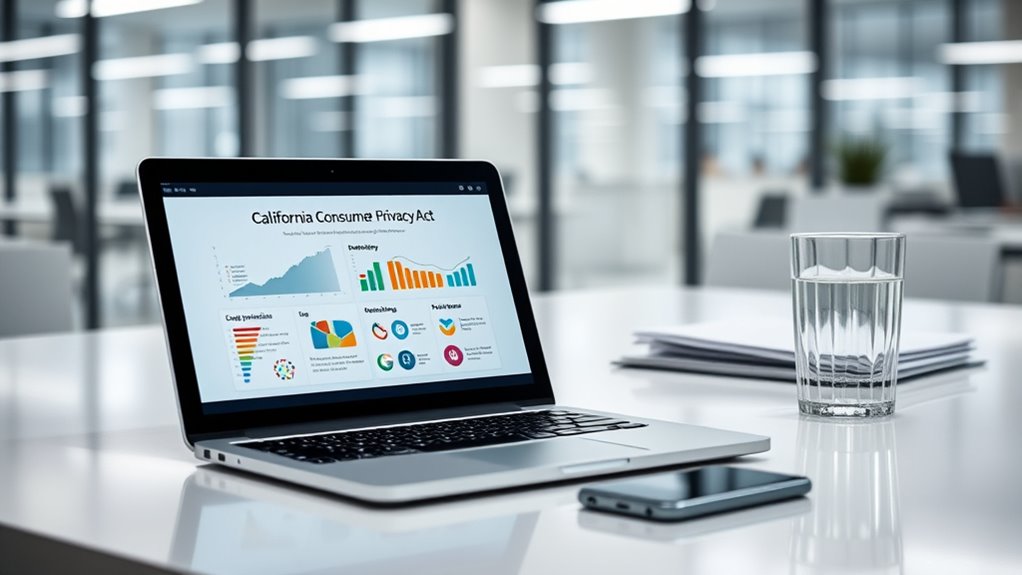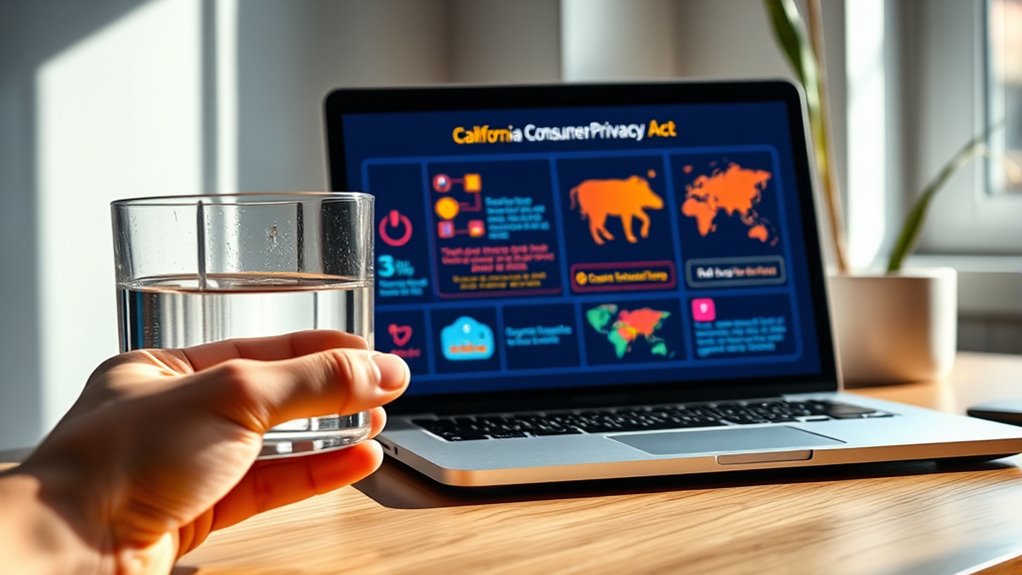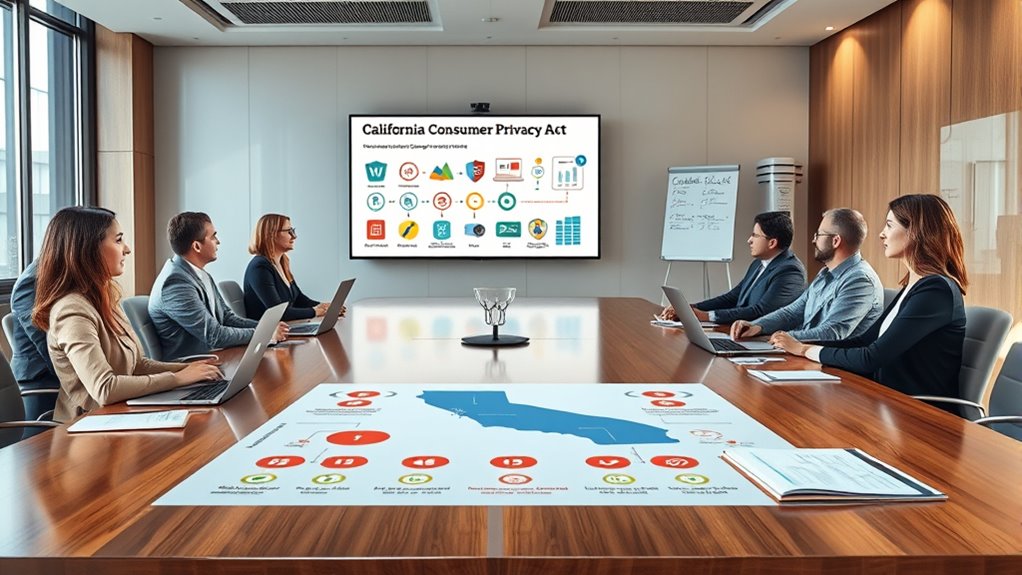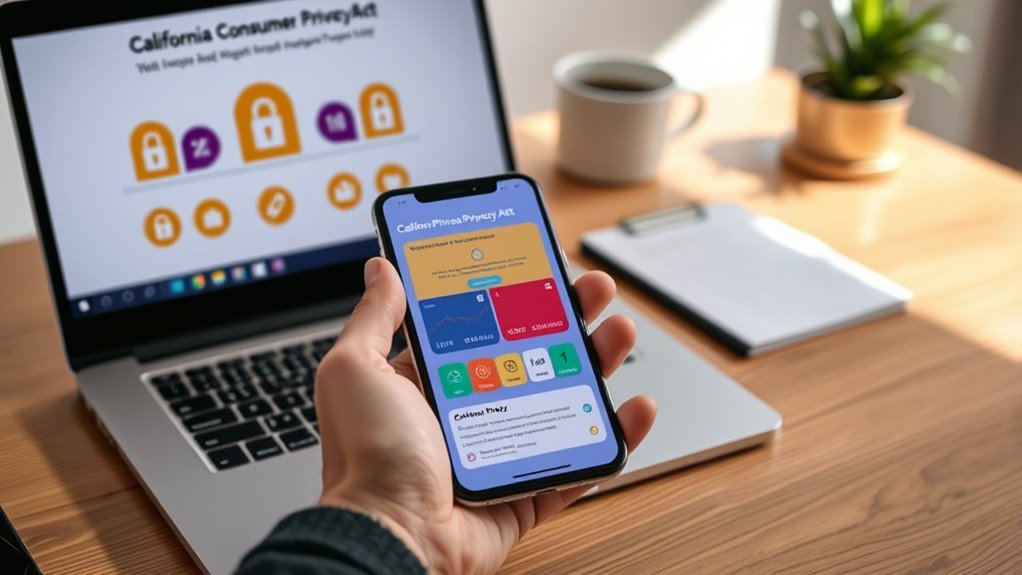The California Consumer Privacy Act (CCPA) gives you control over your personal data online. It applies to businesses with over $25 million in revenue or those handling data for 50,000+ consumers, and provides rights like knowing what data is collected, requesting deletion, and opting out of sales. Businesses must be transparent and protect your information. To learn how these rules protect you and what steps you can take, keep exploring the details.
Key Takeaways
- The CCPA grants California residents rights to access, delete, and opt out of the sale of their personal data.
- It applies to businesses earning over $25 million annually or handling data for over 50,000 consumers.
- Companies must be transparent about data collection, usage, sharing, and maintain clear privacy policies.
- Violations can lead to significant fines, lawsuits, and enforcement actions by regulatory agencies.
- The law aims to empower consumers with control over their personal information and promote responsible data practices.
What Is the CCPA and Why Was It Enacted

Have you ever wondered how your personal data is collected and used online? The CCPA was created to give you greater control over that data. It’s a law designed to protect your consumer rights by establishing clear privacy regulations for businesses handling California residents’ information. Enacted in 2018, the California Consumer Privacy Act aims to hold companies accountable for their data practices. It grants you the right to know what personal data is being collected, why it’s being used, and who it’s shared with. The law also allows you to request deletion of your data and opt out of data sales. The CCPA’s purpose is to ensure transparency and empower consumers to make informed choices about their online privacy. High refresh rates and other technical features also play a significant role in how data is managed and transmitted in digital devices.
Who Is Covered by the CCPA

If you run a business that meets certain size or revenue thresholds, you’re likely covered by the CCPA. Consumers who are California residents and their personal data also fall under its protections. Understanding which data the law covers helps you know your rights and responsibilities under the act. Additionally, businesses should be aware of Halloween traditions and how they might impact marketing or promotional activities during the holiday season.
Businesses Subject to Law
The California Consumer Privacy Act applies primarily to businesses that meet specific criteria related to their operations within the state. If your business has annual gross revenues over $25 million, handles personal data of 50,000 or more consumers, or earns half of its revenue from selling personal data, you’re likely covered. These businesses must implement strong privacy policies to inform consumers about data collection and usage. They’re also responsible for protecting personal information against data breaches, which can lead to legal penalties. Even if your business isn’t directly selling data, if you meet these thresholds, you’re still subject to the law’s requirements. Being covered means you need to be transparent, update privacy policies regularly, and ensure consumer rights are respected. Additionally, understanding trust issues with boyfriend no-shows can help businesses foster more reliable relationships with their customers and build trust.
Consumer Eligibility Criteria
Consumers qualify for protections under the CCPA if they meet certain criteria related to their personal data and residency. If you’re a California resident and your personal information exceeds a specific threshold—such as doing business with a company that has annual revenues over $25 million, handles data for 50,000 or more consumers, or earns over half its revenue from selling consumer data—you’re likely covered. The law aims to enhance consumer privacy and data security by giving you control over your personal information. Even if you’re a smaller business, if you meet these criteria, the CCPA applies to you. This ensures that your consumer privacy rights are protected, and companies must handle your data responsibly. Signs of spoilage can help determine if lemon juice is still safe to consume.
Data Covered by CCPA
Who exactly is covered by the CCPA? If you’re a business that collects personal information from California residents and meet certain thresholds—like annual revenue over $25 million, handling data for over 50,000 consumers, or earning more than half your revenue from selling personal data—you’re likely subject to the law. The CCPA mandates transparent privacy policies, so you must clearly explain what data you collect, how you use it, and how you protect it. It also emphasizes data security, requiring businesses to implement reasonable safeguards against breaches. If you sell or share personal information, you need to give consumers control over their data. Knowing who is covered helps ensure you’re compliant and respects consumer privacy rights under the law. Additionally, understanding the scope of forsale 100 can help businesses determine their obligations under the CCPA.
Key Rights Granted to Consumers Under the Law

Under the CCPA, you have the right to access the personal data businesses hold about you. You can also request that your data be deleted and choose to opt out of data sales. These rights empower you to better control your information and protect your privacy. Understanding vetted products can help ensure your data is handled safely and responsibly.
Data Access Rights
Have you ever wondered what personal data companies hold about you? Under the California Consumer Privacy Act, you have the right to access that information. You can request details about the types of data collected, how it’s used, and with whom it’s shared. Companies are required to respond within a specific timeframe and provide you with a copy of your data. This right helps you understand your data security and privacy policies better, giving you transparency and control. By exercising this right, you can identify inaccuracies and ensure your information is being handled properly. The law emphasizes that businesses must respect your access rights and keep your data protected while providing clear, accessible information about their data practices. Transparency about data collection and sharing is a fundamental aspect of this law.
Deletion Requests Allowed
You have the right to request that companies delete your personal data under the California Consumer Privacy Act. This empowers you to take control of your privacy and defend your information from unnecessary exposure. When you submit a deletion request, companies must honor it, updating their privacy policies to reflect your rights. They are also responsible for ensuring data security during the process, preventing unauthorized access. Practicing mindfulness can help you stay aware of your digital footprint and make informed decisions about your data privacy.
Opt-Out Options Available
Did you know that the California Consumer Privacy Act gives you the power to opt out of certain data collection and sharing practices? This law provides clear opt-out mechanisms, empowering you to make informed consumer choices. When you choose to opt out, you:
- Protect your personal information from unwanted sharing
- Gain control over who accesses your data
- Reduce targeted advertising and privacy risks
- Assert your rights as a consumer in the digital age
These opt-out options ensure you’re not forced into data practices you’re uncomfortable with. Your choices matter, and the law makes it easier to safeguard your privacy. By understanding your rights, you can confidently navigate online interactions, knowing you control your personal information every step of the way. Additionally, understanding trailer music techniques can help you recognize how audio influences your perception of media content.
Business Responsibilities and Compliance Requirements

Under the California Consumer Privacy Act (CCPA), businesses are required to implement specific measures to safeguard consumer data and guarantee compliance. You must develop and maintain clear privacy policies that inform consumers about how their data is collected, used, and shared. These policies should be easily accessible and written in plain language. You’re also responsible for preventing data breaches by applying appropriate security measures. If a data breach occurs, you need to notify affected consumers promptly and take steps to mitigate the harm. Regularly reviewing and updating your privacy policies and security protocols is vital to stay compliant. Embracing a creative practice approach can help develop innovative solutions for complex compliance challenges. Failing to meet these responsibilities can result in penalties and damage your reputation, so proactive measures are essential to protect consumer data effectively.
How to Exercise Your Rights as a Consumer

Wondering how to exercise your rights under the California Consumer Privacy Act? You have the power to take control of your privacy concerns and strengthen your consumer empowerment. Here’s how you can do it:
Learn to exercise your rights under the California Consumer Privacy Act and take control of your privacy today.
- Request access to the personal data companies hold about you, giving you insight and transparency.
- Ask for deletion of your data if you no longer want it stored or used.
- Opt-out of the sale of your personal information to protect your privacy.
- Contact companies directly to clarify your rights or report concerns.
Taking these steps ensures you actively protect your privacy and harness your rights as a consumer. Remember, your awareness and action are essential to maintaining control in a data-driven world. Your empowerment starts with understanding and asserting these rights.
Data Collection, Use, and Sharing Practices

Understanding how companies collect, use, and share your personal data is key to protecting your privacy. Many businesses rely on third party trackers to gather information about your online activities, which they use for targeted advertising or analytics. Under the CCPA, you have rights to know what data is collected and how it’s shared. Companies may share your data with third parties, but they must be transparent about these practices. To prevent data breaches, it’s important to understand how your information is handled and to choose services that prioritize data security. Being aware of these practices helps you make informed decisions about sharing your information and holding companies accountable for responsible data use and sharing.
Penalties and Enforcement of the CCPA

Violations of the California Consumer Privacy Act can lead to significant penalties for businesses that fail to comply with its provisions. Enforcement agencies actively monitor compliance, and failure to conduct regular privacy audits can result in costly consequences. If caught, you might face:
- Heavy fines that damage your reputation and finances
- Lawsuits from consumers seeking compensation
- Mandatory corrective actions that disrupt your operations
- Increased scrutiny on your privacy practices in the future
The law empowers enforcement agencies to investigate and penalize non-compliant businesses, emphasizing the importance of proactive privacy measures. Staying vigilant with privacy audits and adhering to the CCPA’s requirements is essentialto avoid these severe penalties and maintain consumer trust.
Recent Updates and Future Developments

Recent updates to the California Consumer Privacy Act reflect ongoing efforts to strengthen consumer protections and clarify compliance requirements. Legislative updates continue to shape the privacy landscape, aligning laws with evolving privacy trends. New regulations aim to close loopholes and enhance transparency, making it easier for consumers to understand their rights. These changes demonstrate California’s commitment to keeping pace with technological advancements and data security concerns. As privacy trends shift toward more user control and data minimization, future developments are likely to emphasize stricter enforcement and expanded consumer rights. Staying informed about these updates helps you understand your rights and obligations under the law. Regular legislative updates signal that privacy protections will remain a priority, influencing how businesses handle personal data moving forward.
Tips for Businesses to Stay Compliant

Staying compliant with the California Consumer Privacy Act requires proactive measures as laws continue to evolve. To keep up, regularly update your privacy policies, ensuring they clearly explain how you handle data and customer rights. Invest in robust data security measures to protect sensitive information from breaches. Train your staff to recognize privacy risks and respond swiftly to data requests. Stay informed about legal changes and industry best practices to adapt quickly.
- Make transparency a priority to build trust and avoid penalties
- Conduct regular audits to identify and fix vulnerabilities
- Implement strong access controls for sensitive data
- Foster a privacy-first culture within your organization
Frequently Asked Questions
How Does the CCPA Compare to Other Privacy Laws?
When you compare the CCPA to other privacy laws, you see it emphasizes consumer rights like access and deletion of data. Unlike international standards, which often focus on broad data security, the CCPA specifically addresses data breaches and gives California residents more control. It’s more extensive than some laws but less strict than others like GDPR, making it a unique blend of consumer protection and privacy regulation.
Are There Exemptions for Certain Types of Data?
You’ll find that the CCPA includes certain data exemptions, limiting its privacy scope. For example, it doesn’t cover personal data collected for journalistic, literary, or artistic purposes, nor does it apply to data governed by other federal laws. Additionally, information related to healthcare, employment, or other specific sectors may be exempt. These exemptions help define the scope of the law, clarifying which data is protected and which falls outside its reach.
How Often Do Businesses Need to Update Their Compliance?
You should update your compliance regularly to stay ahead of new regulations and guarantee ongoing protection. Conduct frequent privacy audits and keep employee training current so your team understands evolving requirements. This proactive approach helps identify gaps and maintain compliance with laws like the CCPA. Regular updates also demonstrate your commitment to privacy, reducing risks and building trust with your customers. Stay vigilant and review your policies at least annually or whenever significant changes occur.
What Are Consumers’ Rights to Data Deletion?
You have the right to submit data deletion requests under consumer rights, allowing you to ask businesses to delete your personal information. When you exercise this right, the company must respond promptly and take reasonable steps to erase your data, unless they have legal reasons to retain it. Your ability to request data deletion empowers you to control your personal information and protect your privacy.
How Can Small Businesses Effectively Implement CCPA Requirements?
Did you know 60% of small businesses struggle with CCPA compliance? To implement CCPA requirements effectively, you should start with thorough data mapping to understand what personal information you collect. Employee training is vital—ensure your team knows privacy policies and procedures. Regularly review and update your practices, and keep documentation of compliance efforts. This proactive approach helps protect customer data and avoids costly penalties.
Conclusion
So, after all this, you’d think businesses would get it right by now, right? But here’s the irony: despite the CCPA’s clear rules, some still slip up, risking hefty fines and lost trust. As a savvy consumer, you hold real power—so keep exercising those rights. Because in a world full of data, your privacy is your true gold, and it’s worth defending—even if companies pretend they’re above the law.









